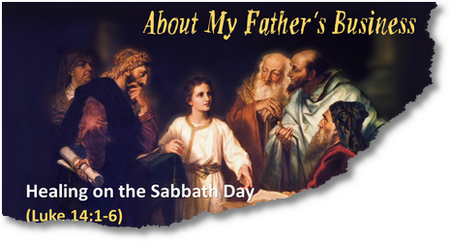Category: Pharisee
Subject: Pharisee
Sermon: Go and Sin No More
20th in Series. Jesus deals with Pharisees who sought to entrap him when the brought a woman caught in the act of adultery to see what He would say. John 8:1-12
Sermon: The Man with a Withered Hand

19th in a series on the life and ministry of Jesus Christ. This text of Mark 3:1-6 examines Jesus’ healing of a man with a withered hand in the face of the ungodly opposition of the Pharisees. Hard hearts and deceitful plotting did not keep the Lord from doing what was lawful and good.
Sermon: Healing on the Sabbath Day

Jesus’ questions to the Pharisees in our text reveal two important points. We must always handle the word of truth with honesty, and our appeal to God’s word must never be an excuse to ignore the suffering of men.
Exceeding the Righteousness of the Pharisees
 The Pharisees were a sect of Jews during the time of Jesus known for a strict adherence to the Law of Moses. The name means “separatists”, and the International Standard Bible Encyclopedia notes that they were, “those who carefully kept themselves from any legal contamination, distinguishing themselves by their care in such matters from the common people, … who had fewer scruples.”
The Pharisees were a sect of Jews during the time of Jesus known for a strict adherence to the Law of Moses. The name means “separatists”, and the International Standard Bible Encyclopedia notes that they were, “those who carefully kept themselves from any legal contamination, distinguishing themselves by their care in such matters from the common people, … who had fewer scruples.”
The scrupulosity of the Pharisee is acknowledged by the Lord in Matthew 23:23, when in speaking with them he said, “For you pay tithe of mint and anise and cumin…” Earlier in the chapter, He told his disciples “whatever they [the Pharisees] tell you to observe, that observe and do.”
Continue reading “Exceeding the Righteousness of the Pharisees” →
Sermon: Concepts of Authority (2) – Those Terrible Pharisees
Faithful Christians who contend for truth, and claim authority for religious practices are often unfairly called Pharisees, or referred to with derision as legalists and patternists. This sermon describes the sins of the Pharisees, and defends the concept of obedience to God’s authority.
Sermon Powerpoint: Click Here .
Sermon Audio: Click Here .
Sermon: Denouncing the Pharisee
This sermon examines the severe denunciation of the Pharisee, spoken by the Lord in Matthew 23.
Sermon Audio: Click Here .
Sermon: Lost Religious People
Whether it be the hypocrisy of the Pharisees, the imperfect knowledge of Christ exhibited by Saul, The Eunuch and Cornelius prior to their exposure to the gospel of Christ, or the Lukewarmness of the Laodiceans, just being “religious” does not guarantee salvation.
Sermon PowerPoint: Click Here .
Sermon Audio: Click Here .
Pharisaism
 During Jesus’ ministry, there were three main sects of the Jews that influenced Jewish politics and culture. The Pharisees, Sadducees, and Essenes.
During Jesus’ ministry, there were three main sects of the Jews that influenced Jewish politics and culture. The Pharisees, Sadducees, and Essenes.
Interestingly, the Essenes are not mentioned in the New Testament writings. Perhaps their tendencies toward asceticism and monasticism separated them from the common Jew, and limited their influence upon Jewish culture. (Note: It is believed that it was an Essene community, Qumran, that was responsible for the penning of the Dead Sea Scrolls).
The Sadducees were characteristically liberal and secular in their outlook. They were political animals, often affluent, and held the highest political offices among the Jews. “They were a political party, of priestly and aristocratic tendency, as against the more religious and democratic Pharisees” (ISBE, Vol. IV, pg. 2659).
The Pharisees were, as noted above, more religious. In fact, at least in outward form, the Pharisee seemed to mirror most closely the teaching and philosophy of our Lord. For example: 1) The Pharisee contended for the importance of separating himself from ungodly and worldly influences; 2) The Pharisee was very attentive to the Law of God, and careful in his exposition of its teaching; 3) The Pharisee emphasized the importance of diligent obedience to the Law of God; 4) The Pharisee was eager to convert others to his beliefs, and was active in proselytizing; 5) The Pharisee was very active religiously, and many saw the expressions of his faith.





